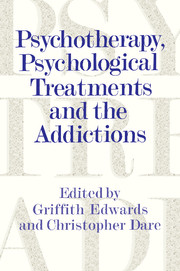Book contents
- Frontmatter
- Contents
- List of contributors
- Psychotherapy and psychological treatments of substance problems: generalism, specialism and the building of bridges
- Acknowledgements
- Part one Backgrounds to therapeutic understanding
- Part two Treatments
- 5 Psychotherapy: why do some need more and some need less?
- 6 Addictive behaviour: the next clinic appointment
- 7 Advances in families and couples therapy
- 8 Solution focused brief therapy: a co-operative approach to work with clients
- 9 Recent developments in cognitive and behavioural therapies
- 10 Cognitive and behavioural treatments for substance misuse
- 11 Motivational issues in the treatment of addictive behaviour
- 12 Can ‘stages of change’ provide guidance in the treatment of addictions? A critical examination of Prochaska and DiClemente's model
- 13 Group therapy and the addictions
- 14 Alcoholics Anonymous as mirror held up to nature
- 15 How therapeutic communities work
- Part three Postscript
- Index
6 - Addictive behaviour: the next clinic appointment
from Part two - Treatments
Published online by Cambridge University Press: 05 August 2016
- Frontmatter
- Contents
- List of contributors
- Psychotherapy and psychological treatments of substance problems: generalism, specialism and the building of bridges
- Acknowledgements
- Part one Backgrounds to therapeutic understanding
- Part two Treatments
- 5 Psychotherapy: why do some need more and some need less?
- 6 Addictive behaviour: the next clinic appointment
- 7 Advances in families and couples therapy
- 8 Solution focused brief therapy: a co-operative approach to work with clients
- 9 Recent developments in cognitive and behavioural therapies
- 10 Cognitive and behavioural treatments for substance misuse
- 11 Motivational issues in the treatment of addictive behaviour
- 12 Can ‘stages of change’ provide guidance in the treatment of addictions? A critical examination of Prochaska and DiClemente's model
- 13 Group therapy and the addictions
- 14 Alcoholics Anonymous as mirror held up to nature
- 15 How therapeutic communities work
- Part three Postscript
- Index
Summary
Introduction
Dependence on alcohol or on other drugs, once established, constitutes a potentially malign condition. Consider, for example, results from a 20- year follow-up of 100 men with alcohol dependence (Marshall et al., 1994), who at the study intake point had a mean age of 42. Twenty years later, 44% had died, with an observed/expected mortality ratio of 3.64. Seventeen per cent were still drinking in a dependent fashion and 17% were abstinent. The 11% who had achieved social drinking included subjects whose loss of tolerance or state of physical health now precluded anything but a moderate intake. If we were to apportion the 11 % untraced equally between troubled and untroubled drinking, the data would suggest that 20 years subsequent to the study intake point almost exactly two-thirds of patients will be dead or still drinking in a destructive fashion, while one-third will be abstinent or have ameliorated their drinking. These results are much in line with previous findings, (for instance, those of Nicholls et al., 1974; Edwards et al., 1983; Vaillant, 1983; Berglund, 1984; Frances et al., 1987).
If these data on alcohol dependence are worrying, they contrast favourably with parallel data from a 22-year follow-up that the National Addiction Centre has conducted on a cohort of 128 heroin users (Oppenheimer et al., 1994). Subjects had a mean age of 26 years at study intake and at the follow-up the observed/expected mortality ratio was something over 12. In other words, these young addicts faced twelve times the mortality expectation of their non-addict contemporaries. This study overlapped with, but largely predated, the HIV era, and HIV is in the long-term likely to add significantly to the mortality experience of injecting drug users. Other studies from a number of different countries confirm the seriousness of opiate dependence (Vaillant, 1973; Murphy, 1988; Rossow, 1994; Marx et al, 1994).
Thus, by any reckoning, substance dependence is a worrying, life-threatening condition. We and our patients are playing for high stakes and it must surely behove us to meet our responsibilities by getting the best possible treatment in place for each patient, and as early as possible.
- Type
- Chapter
- Information
- Psychotherapy, Psychological Treatments and the Addictions , pp. 94 - 109Publisher: Cambridge University PressPrint publication year: 1996
- 4
- Cited by



